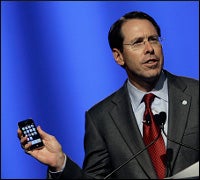 |
| AT&T Chairman and CEO Randall Stephenson speaks at NXTcomm last year. Source: AT&T |
A California congresswoman is asking AT&T to clarify the apparent discrepancies in the testimony of its chief privacy officer at a hearing on last week focusing on ISPs’ use of behavioral targeting technologies.
AT&T (NYSE: T) says it’s all just a misunderstanding.
Rep. Anna Eshoo, a Democrat, has sent a letter to AT&T CEO Randall Stephenson asking the company to explain its relationship with AudienceScience, a behavioral-targeting firm that until recently listed AT&T as a partner on its Web site.
Eshoo sent the letter a day after a hearing where AT&T’s Dorothy Attwood testified that the company did not engage in any behavioral targeting of its Internet subscribers, saying that she wasn’t aware of a relationship with AudienceScience. Attwood said that if AT&T ever adopted a technology like deep-packet inspection (DPI) to tailor ads to people’s Web browsing activities, it would undertake a substantial effort to educate its customers about the practice and secure their meaningful, informed consent.
But Eshoo pointed to a story that appeared on the site MediaPost.com, which noted that AT&T had been identified on Audience Science’s site as an advertising partner.
“In light of this apparently contradictory information, I would ask you to respond in writing to help clarify this discrepancy as to whether AT&T is in fact engaged in behavioral targeting online,” Eshoo wrote.
AT&T spokesman Michael Balmoris told InternetNews.com that the issue was “pretty straightforward,” and that the confusion stemmed from AT&T’s multiple roles in the Internet ecosystem.
“As an ISP, we do not track our customer’s data across unrelated websites to create a profile for behavioral advertising, or hire other firms to do so on our behalf,” the company said in a statement. “Our relationship with this firm is as an advertiser of AT&T products and services. A news report suggesting that we are engaging in behavioral advertising by selling information of our customers is flat wrong.”
Balmoris explained that AT&T uses ad networks and various targeting technologies when it is selling ad inventory on its content Web sites or advertising its own products and services, but that it does not engage in those practices as an ISP.
The witnesses at last week’s hearing said that to their knowledge, no U.S. ISP was using technologies like DPI to profile its subscribers and serve them ads based on their browsing activities.
The House Subcommittee on Communications, Technology and the Internet held the hearing as the panel’s Democratic and Republican leaders begin work drafting an online privacy bill that would limit the data-collection practices of Internet companies.
Behavioral targeting has been a longstanding practice of online publishers and advertisers, and privacy advocates have raised deep concerns about the detailed profiles companies like Google (NASDAQ: GOOG) and Yahoo (NASDAQ: YHOO) compile about their users. But the privacy fears reached a fevered pitch last summer when an ad-tech company called NebuAd started signing up several ISPs for a technology it offered that tracked users’ Web browsing in an attempt to bring them into the online advertising revenue stream.
NebuAd’s CEO at the time made the rounds on Capitol Hill, testifying before suspicious committees in the House and the Senate that his company’s technology had state-of-the-art privacy protections in place. NebuAd’s use of DPI technology became a lightning rod for controversy, and the company’s clients shelved their trials of its service. CEO Bob Dykes left the company, which no longer offers a DPI-based ad service.
At last week’s hearing, Eshoo said that as “common carriers,” ISPs should bear a stronger responsibility for protecting users’ privacy than Web companies, which obtain an implicit form of consent every time consumers use their services.
Eshoo spokeswoman Danielle Lee told InternetNews.com that AT&T has yet to respond to the congresswoman’s inquiry.


